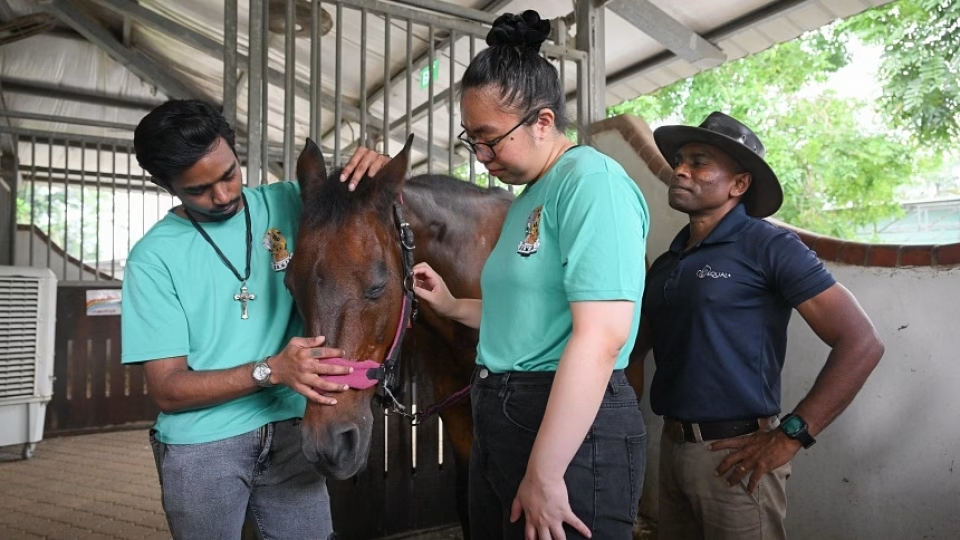October 28, 2024
SINGAPORE – In Secondary 3, Ms Angel Huang, 20, dropped out of school. She could not keep up with her studies and felt that the academic “rat race” among students was too stressful.
For three years, she stayed at home, became more withdrawn and found that “even talking to others can be quite frightening”, she said.
As she saw her peers move on to polytechnic and junior college, she felt even more alienated and left behind.
But she has found a safe space to build her confidence and social skills – through an animal care programme started by social service agency Fei Yue Community Services (FYCS). It included exposure to the work of zoo staff.
On Oct 24, she completed the last of five sessions of the “Horse-ibilities” programme, where she fed horses and groomed them, among other things.
These sessions with the horses were organised in collaboration with Equal, a charity which runs equine-assisted learning programmes to improve people’s well-being. The pilot run of the collaboration, aimed at helping with young people’s social-emotional development, started in September.
By interacting with the horses and caring for them, the youth learn responsibility and empathy, as well as how to build trust, confidence and communication skills, said Equal’s head of programmes and services, Ms Ann Hui Peng.
Ms Ann said horses are highly intuitive and sensitive creatures, and they often mirror human emotions, making them ideal partners to help the youth better understand their own emotions and behaviours.
The initiative is part of FYCS’ animal care programme to engage young people who are not studying or working, known as Neet youth. Neet stands for not in education, employment or training.
The sessions have helped in Ms Huang’s growth, easing her anxiety about socialising with other people.
“The animals gave me a safe space and helped me to de-stress, learn more about myself and find myself,” she said, adding that it has helped her build her confidence. She has also learnt soft skills such as initiating conversations and learning to work in a team.
She plans to take the O levels as a private candidate for a start, in the hope of fulfilling her dream of working with animals in the future.
Ms Andria Choo, a senior social worker at FYCS, said it is the first social service agency to develop a specialised programme using animal-assisted services for Neet youth here. It did so as it learnt that many of the Neet youth it helps are drawn to animals.
In Singapore, animal-assisted therapy has been used for stroke patients, seniors in nursing homes and those with special needs, among others.
Ms Clarissa Gan, an assistant senior social worker at FYCS, said: “They (the youth) have a very guarded and defensive exterior, but this melts away when they interact with animals. Animals have an unconditional acceptance. Animals don’t judge them.”
More than 220 young people have taken part in FYCS’ animal care programme since it started in 2020.
In the beginning, the programme had only sessions where participants interacted with animals such as cats, dogs and rabbits in places like cat cafes and animal shelters.
In 2022, a vocational component was added. FYCS partnered CapitaLand Hope Foundation to develop a programme to help the youth understand their strengths and interests and explore vocational pathways, said Ms Gan.
Over four sessions held at the zoo, participants in the Youth-Reka programme learn from zoo staff about their work and life stories, and help out with tasks such as cleaning animal enclosures and preparing food for the animals at the Mandai Wildlife Reserve.
During the other four sessions run by FYCS, the young people learn to prepare their job resumes, among other skills.
The Neet youth in the animal care programme include those who get into trouble with the law, those with mental health conditions, and reclusive youth who shut themselves in their rooms 24/7, Ms Gan said.
They usually struggle with multiple problems, such as strained ties with family and their peers, and feeling down or anxious.
In extreme cases, some of the reclusive youth have not left their homes for up to a few years. For others, going out to buy food or taking public transport is a big struggle, said Ms Gan.
She added of these reclusive youth: “Some are very fearful of social interactions and the outside world seems very unsafe to them.”
In September, it was reported that there were around 17,000 Neet youth aged 15 to 24 in 2023, representing 4.1 per cent of youth here.
FYCS’ head of youth services, Mr Benjamin Yeo, said parents of such youth often feel shame and grief that their children are “wasting their lives away”. They also worry how their children would support themselves in the future.
Mr Emmanuel Nicholas, 19, dropped out of a tertiary education institution as he found it hard to focus in class, among other reasons. He stayed at home for about a year, spending his time watching television.
After joining FYCS’ animal care programme, he has learnt to be calmer and to better manage his emotions and actions.
“Being around animals makes me happier than being around people,” said Mr Nicholas, who has recently landed a job in events management.
Besides FYCS, social service agency Shine Children and Youth Services also started an animal-assisted care programme in 2022.
In its Just Fur Fun 2.0 programme, secondary school students facing mental distress interact with cats at a cat cafe over four sessions. Group facilitators cover topics such as help-seeking, building relationships and self-care at the same time.
A Shine spokesman said: “During play time with the cats, participants find comfort and support as their interactions often lead to surprising connections, as they relate their own behaviours to those of the cats.
“This approach helps with broaching sensitive topics in a safe and engaging way.”


